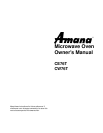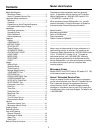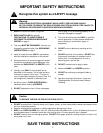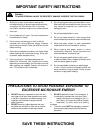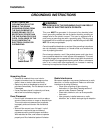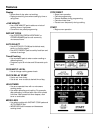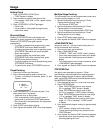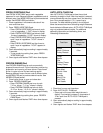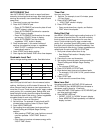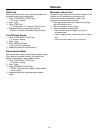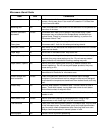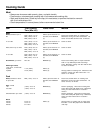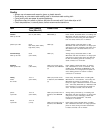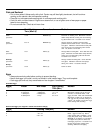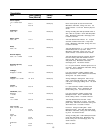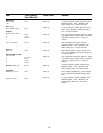
4
IMPORTANT SAFETY INSTRUCTIONS
SAVE THESE INSTRUCTIONS
c. DO NOT operate the oven if it is damaged. It
is particularly important the oven door close
properly and there is no damage to the: (1)
door (bent), (2) hinges and latches (broken
or loosened), (3) door seals and sealing
surfaces.
d. The oven should NOT be adjusted or repaired
by anyone except properly qualified service
personnel.
a. DO NOT attempt to operate this oven with the
door open since open-door operation can result
in harmful exposure to microwave energy. It is
important not to defeat or tamper with the
safety interlocks.
b. DO NOT place any object between the oven
front face and the door or allow soil or cleaner
residue to accumulate on sealing surfaces.
PRECAUTIONS TO AVOID POSSIBLE EXPOSURE TO
EXCESSIVE MICROWAVE ENERGY
Caution
TO AVOID PERSONAL INJURY OR PROPERTY DAMAGE, OBSERVE THE FOLLOWING:
1. Briskly stir or pour liquids before heating with
microwave energy to prevent spontaneous boiling
or eruption. Do not overheat. If air is not mixed
into a liquid, liquid can erupt in oven or after removal
from oven.
2. Do not deep fat fry in oven. Fat could overheat and
be hazardous to handle.
3. Do not cook or reheat eggs in shell or with an
unbroken yolk using microwave energy. Pressure
may build up and erupt. Pierce yolk with fork or knife
before cooking.
4. Pierce skin of potatoes, tomatoes, and similar foods
before cooking with microwave energy. When skin
is pierced, steam escapes evenly.
5. Use only popcorn in packages designed and
labeled for microwave use. Popping time varies
depending on oven wattage. Do not continue to heat
after popping has stopped. Popcorn will scorch or
burn. Do not leave oven unattended.
6. Do not use regular cooking thermometers in oven.
Most cooking thermometers contain mercury and
may cause an electrical arc, malfunction, or
damage to oven.
7. Do not heat baby bottles in oven.
8. Do not use metal utensils in oven except when
recommended by microwave food manufacturers.
9. Never use paper, plastic, or other combustible
materials that are not intended for cooking.
10. When cooking with paper, plastic, or other
combustible materials, follow manufacturer's
recommendations on product use.
11. Do not use paper towels which contain nylon
or other synthetic fibers. Heated synthetics could
melt and cause paper to ignite.
12. Do not heat sealed containers or plastic bags
in oven. Food or liquid could expand quickly and
cause container or bag to break. Pierce or open
container or bag before heating.



